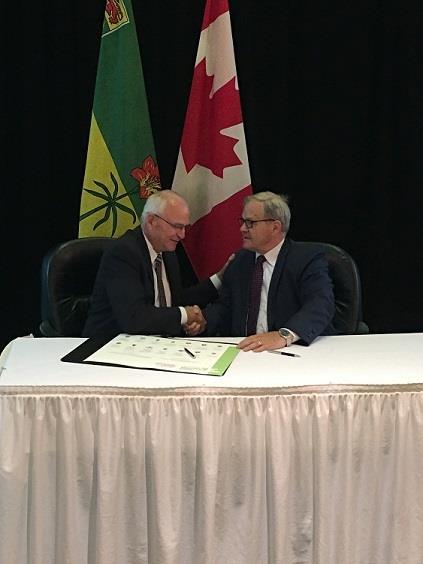Released on July 21, 2017
Today, Saskatchewan Agriculture Minister Lyle Stewart joined Federal Agriculture Minister Lawrence MacAulay, and agriculture ministers from across the country to reach an agreement on the Canadian Agricultural Partnership (CAP).
CAP is a five year federal-provincial-territorial funding agreement that takes effect on April 1, 2018 and replaces Growing Forward 2 (GF2). It governs business risk management (BRM) programs such as Crop Insurance, AgriStability and AgriInvest and investments in strategic initiatives.
“The Canadian Agricultural Partnership will help ensure agriculture producers and industry have access to important funding to innovate, expand and help Saskatchewan remain a world-class agri-food producer and supplier,” Stewart said.
CAP will maintain the same level of funding as GF2. Canada and Saskatchewan will invest a total of $388 million over five years for strategic initiatives in Saskatchewan. The combined provincial and federal funding will support a suite of programs focused on: markets and trade; science, research and innovation; environmental sustainability and climate change; value-added agriculture and agri-food processing; and public trust.
The new agreement includes a change to AgriStability, allowing provinces and territories an option to trigger late participation. Producers would be able to enter the program even if they did not sign up by the deadline, with payments reduced by 20 per cent.
“Saskatchewan does not support late participation in AgriStability as we believe it goes directly against the principle of proactive risk management and does not fix a problem producers have identified,” Stewart said. “We have no intention of triggering late participation under any circumstances in the province. However, in order to reach a deal, the other benefits of this agreement made it important for Saskatchewan to sign on to continue to provide uninterrupted programming for our producers.”
A further change to AgriStability addresses the negative consequences of Reference Margin Limits (RML) in AgriStability, introduced in GF2. The RML will be limited so that AgriStability is fairer for producers with low input costs. In order to keep these changes cost neutral, changes to AgriInvest and AgriStability were required. These are implementing a minimum payment of $250 for both programs and capping AgriInvest payments at $10,000 per producer.
The province is pleased that the Western Livestock Price Insurance Program will continue under CAP.
Governments will review BRM programs over the course of this agreement, starting with AgriStability this year. Findings from the AgriStablity review will be presented to ministers at their 2018 annual meeting.
The provincial government, Saskatchewan Crop Insurance Corporation and the federal government will work together on the transition to CAP to ensure the process is seamless for current and future funding recipients. The Saskatchewan Ministry of Agriculture has engaged with stakeholders throughout the negotiation of the new funding agreement, and intends to conduct further consultations before implementation on April 1, 2018.
-30-
For more information, contact:
Angela Hall
Agriculture
Regina
Phone: 306-787-2359
Email: angela.hall@gov.sk.ca
Cell: 306-529-4199

